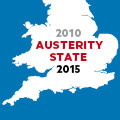Communities and councils team up to soften blow of cutbacks

Roula Khalaf, Editor of the FT, selects her favourite stories in this weekly newsletter.
Amid the Victorian terraces of Oldham, a former mill town near Manchester, a hidden garden is blooming where once only rubbish and graffiti abounded.
A splash of colour in an otherwise dour townscape, this shared space is tended, not by council gardeners but by local people, as Oldham shapes a distinctive new bargain with local people for an era of austerity.
Caroline Lawson, who for 25 years has lived in the street overlooking the “secret garden”, as local children have dubbed it, says it would not have happened without the council’s decision to pay for the installation of alleygates, creating a vandal-free space behind the houses.
She and her neighbours then had a whip round to raise the money to pay for the hire of a skip and mini-digger to clear the land.
“You can’t leave everything to the council as far as keeping places tidy. You’ve got to take responsibility for your own little patch, really,” adds another member of the secret garden team, Dave Owens.
Such sentiments are music to the ears of Jim McMahon, Oldham’s Labour council leader.
Interactive: Local Cuts Checker

Between 2009-10 and 2014-15 spending by England’s 300-plus local authorities was cut by a fifth — more than twice the rate of spending cuts to the rest of the UK public sector. Our Local Cuts Checker database brings together a myriad of data — most compiled by local councils themselves for the purposes of reporting to central government — to allow readers to explore the impact of those cuts in their areas.
Continue reading
The council previously enjoyed the sense that it was “big and important, because we ran the place and it was all ours”, Mr McMahon says. “The measure of success used to be ‘how big’s your budget and how many staff do you employ?’ ”
Now, he says, it is about “saying to the public, actually, ‘the place doesn’t belong to the council’ ”.
Oldham, which serves an area of high deprivation, has also developed a focus on intervening early to prevent higher costs down the line, after discovering that too little was being spent on intermediate services.
Some, at least, of this automatic escalation into high-cost services can be prevented, says Jill Beaumont, head of community services, who adds that the spur of budget cuts “enabled us to think outside the box and be much more creative and help us to break down some silos”.
Mr McMahon believes that local people have noticed few significant reductions, an assertion borne out by a recent council opinion survey that showed almost two-thirds were satisfied with the council’s performance — up from 22 per cent in 2008.
So far efficiency savings have done much of the work in coping with austerity. “We have reduced administration costs, back office costs . . . We’ve been talking now for a long time to the public about cuts and they haven’t been feeling them, so it’s been quite an abstract conversation . . . and the services that people receive have improved, satisfaction’s improved.”

While the council has implemented big cuts in the numbers employed to carry out refuse collection and street cleaning, roles have been merged and redefined, and terms and conditions changed to put staff on seven day rotas. “So people who used to be street cleaners will now also maintain elements of open space,” he explains.
The scope for such savings may now have reached its limit, he indicates. “I think what we are getting to is a point where the efficiencies have gone . . . and people will see the service being removed. I think that’s where we are now.”
He is, he says, “very clear with people in Oldham: today, if there is a community facility that you can see, whether it’s a park or a library or a leisure centre, your best assumption should be that it’s going to close. And if we can find a way of keeping it open, we’ve done well.”
This represents “a fundamental shift”, he acknowledges, but it is part of building a new relationship with local people.
“We’re saying, actually these things might close, but the deal will be you’ll have one really decent facility. And we’ll invest in it, we’ll make sure it’s the best use of public money.”



Comments